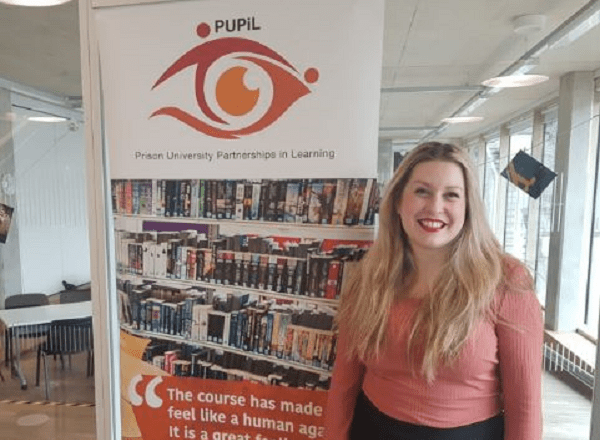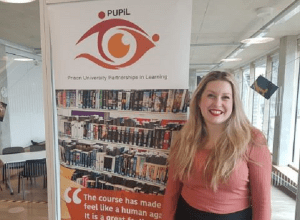

Rosie Reynolds, co-ordinator of the PUPiL network
There is no evidence that people with a criminal conviction are more likely to commit crime whilst at university than those without one. This was the message put across by Chris Stacey, the co-director of Unlock, at the PUPiL widening participation event on World Access to Higher Education Week in November.
The event, organised by Rosie Reynolds co-ordinator of the PUPiL network, was aimed at university access teams and highlighted the positive effects that university-prison partnerships can have. The event was also an opportunity to launch the PUPiL Prison-University Partnerships Toolkit, a resource designed to support the continued growth and development of partnerships.
Download the toolkitFollowing a decision by UCAS last year, prospective students will no longer be asked to declare unspent criminal convictions during the application process. This decision, said Chris, has provided universities with a “great opportunity” to widen access to their courses and positively engage with prison leavers as part of their widening access strategies. Rosie agreed with this, saying “A high proportion have been through the care system, are of Black Ethic Minority Background, from lower socio-economic backgrounds. We should include this group in the drive to widen access, both because it helps make our universities diverse and inclusive, but also because it helps attract students who have often overcome significant barriers to reach this level of education and have shown enormous commitment to building positive futures.” However despite these changes, some universities may continue to ask about criminal convictions separately.
A high proportion of prison leavers have been through the care system, are of Black Ethic Minority Background, from lower socio-economic backgrounds
One of the universities to have taken the step to stop asking is the University of Westminster. Nick Catterall, the Senior Compliance Manager at the university, said his team had done so in part because asking about convictions may be non-compliant with new GDPR laws. Additionally, the belief that not asking means universities are mis-selling courses and therefore at risk from the competition and markets authority was misguided. Nick also countered arguments that the question acted as a safeguard mechanism, as assessments on declarations are often made by staff without criminal justice expertise. Only around 1% of applicants self-declared their previous convictions, and no further support was being offered to those who did. Nick concluded that these issues show that asking about convictions actually goes against safeguarding principles, as support should be provided as it would be to other vulnerable students.
Universities already ask about support needs for disabilities, they should be able to do the same for criminal convictions
Both Chris and Nick argued that other routes should be provided for self-declaration, with targeted support being provided if any convictions and support needs were declared. This was a view supported by Sarah Lambert, of Open Book at Goldsmiths University. Sarah said that universities already ask about support needs for disabilities, they should be able to do the same for criminal convictions – although this should be separate from the admissions process.
When summing up, Chris highlighted that education and employment are significant factors in people moving away from crime. He outlined eight principles for universities to adopt in order to have a fairer admissions policy:
- Understand applicants with criminal records
- Ask only if and when necessary
- Focus on admissions – criminal records can be addressed later on.
- Distinguish between DBS and non DBS courses
- For DBS courses be clear about suitability assessments
- Have clear and accessible policy
- Support applicants with a criminal record
- Talk positively and reach out
If you want to find out more about prison university partnerships, sign up to the monthly PUPiL newsletter here.